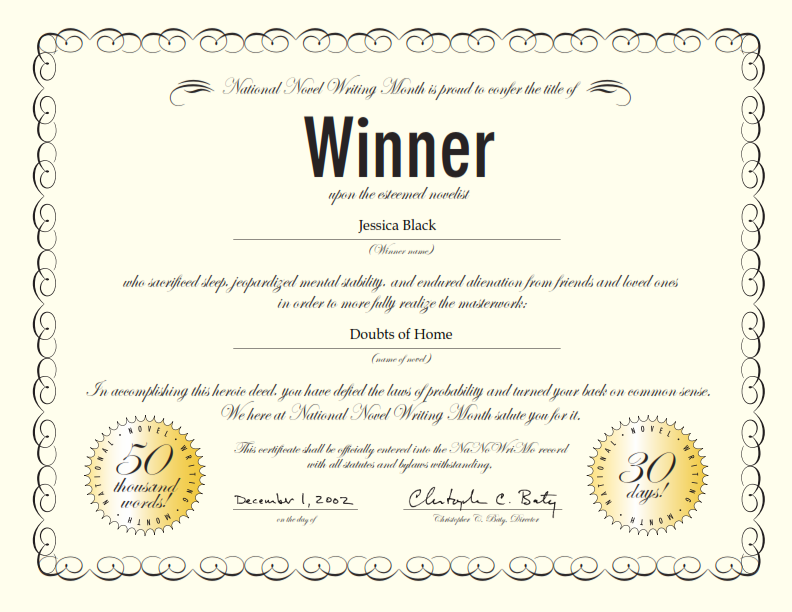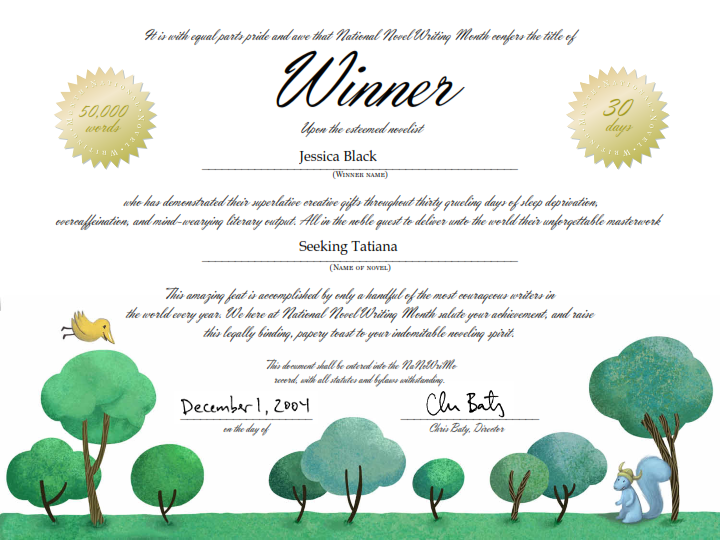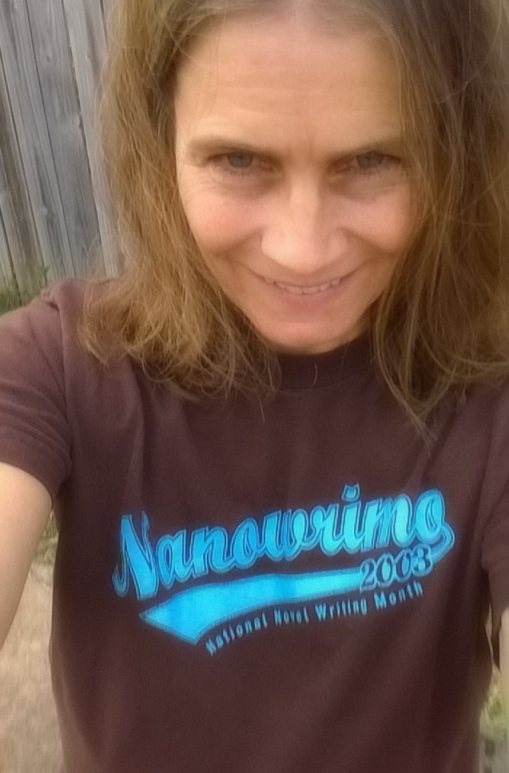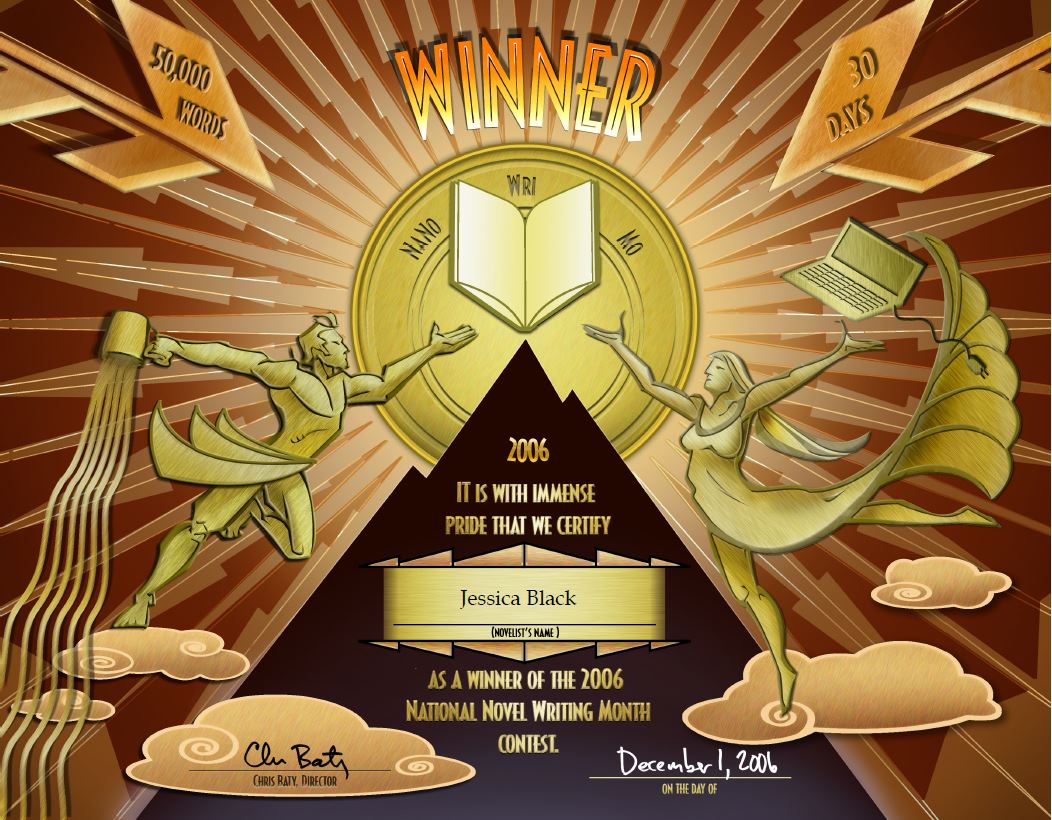How to write a novel… I was going to use On Writing for a title, but then I remembered that Stephen King had taken it. In any case, my main purpose was to offer some suggestions on how to do Nanowrimo.

I am doing nanowrimo 2015. That is National Novel Writing Month, always November (why not a 31 day month??), when a lot of crazy people try to write 50,000 words in 30 days. That’s 1667 words a day with 10 to spare. At this point, November 10th, I am one day ahead of schedule. Why take valuable writing time to post a blog? Because people keep asking me how I do it.
Some background
I am a single mom who has gone back to university for a PhD in research psychology. I have a graduate assistantship that I am fulfilling by working on an external (to the psych department) grant that requires me to be in the office 20 hours/week. Luckily I am not very busy right now (my stats supervisor has been too busy to give me instructions for a fancy modelling paradigm), although I have just been asked to work on a lit review of Dweck’s Mindset paradigm. I guess it looked like I was too relaxed (sadly, my cubicle is right outside my boss’s office.)
I have two 3-hour graduate courses; both require 40-140 pages of reading a week. I have weekly meetings with my (main) advisor and stats/grant advisor, and biweekly lab meetings. I have to coordiinate the running of one of my research projects, and this means organizing 5 undergrad RAs (luckily they are all super responsible and on top of it this semester).
Then of course I have to chauffeur my sons to music lessons, orchestra rehearsals, soccer games and practice, riding lessons, 4H meetings, etc. I ride my own horse 3-4 times a week, and a friend’s horse once a week. Then there are those annoying little details involved in making sure there is food in the pantry and gas in the car, pets are fed, house is not full of cat hair…
So, how does writing 1667 words/day fit in?
I make it fit. There is always a way to do it. I’ve got the advantage of having done it many times before, so I have a method, and I am also fast (in previous years, I allowed two hours to write 1667 words. Now i can do it in one hour, as long as I am focused. Explanations and suggestion below.)

The Nanowrimo website has some excellent suggestions. Here is what I recommend:
- Plan ahead. I start thinking about a novel weeks or months before I start writing it. I write character sketches and plot outlines. Sometimes this is very complicated; I’ve got over 100 pages of outlined “future of the world” that I wrote for one novel (not a nanowrimo project).
- Planning ahead and having an outline allows me to sit down and write, without wasting time planning. I always write this way, but it’s especially useful if you’re trying to get things done in a short period of time.
- It also helps if you get “stuck” to have a game plan for the plot.Of course, some projects require less planning than others, but for me, the more planning I do before starting to write, the smoother writing itself goes.This is especially important for novels based on world-building.
- Plan your world before you sit down to write your novel. Make maps. Name cities and roads and lakes and rivers and seas.
- Once you sit down to write, don’t look back. Just write write write. Don’t worry about errors, If you are like me, everything you write will need extensive revisions even if you slow down and try to get it right the first time. Since you’re going to have to edit anyway, don’t worry about finding the perfect word or turn of phrase.
- When you sit down the next day, do not go back and read what you wrote the day before. OK, maybe you’ll have to read a few sentences, to remind yourself where you are, but never edit anything. Highlight the text if you absolutely must do something, but don’t do any rewriting.
- When you are not writing, you can think about the project and plan it. I do this in the shower, while driving, while running, while falling asleep at night. Jot things down in a notebook or add to your outline if you need to.**
- Be disciplined. If social media is a time-suck for you, don’t allow yourself to go on Facebook (e.g.) until after you’ve reached your daily word count goal. Back in the days of primitive internet access, I wouldn’t let myself even go on-line until I had finished writing for the day. Now of course we are always connected.
** Be careful that you don’t get so much into your fictional world that you fail to notice the real world. While working on a novel, I’ve been known to forget to pick up my children from preschool, go the wrong way on a motorway, wander around Madrid all morning (it’s full of clocks) under the delusion that Daylight Savings time hadn’t happened (until the boys’ school called me asking why I was a half hour late to pick them up; this doesn’t count as forgetting because i hadn’t “forgotten”; I just didn’t know what time it was.)
Also, use classical conditioning. Train yourself to write upon certain cues. For example, I like to listen to the Goldberg Variations when I write. I know them so well that I never have to “listen” to the music; if I get lost in my writing, I can look up and know exactly where the pianist is in the music. I can’t listen to all music when I am writing; if it’s too dramatic, or too new, I get distracted and listen rather than write. But repetitive, very familiar music is ideal. Now just putting on The Goldberg Variations helps me focus and get down to writing. Of course it wasn’t always that way… but I’ve trained myself to associate certain music (mainly Bach) with writing, so it makes it much easier.
Some more history
I first did nanowrimo in 2002, when my youngest was still a baby and we were living in Managua, Nicaragua. I wrote a 55,000 word navel-gazing novella… well, not really navel-gazing, but the heroine was returning home to California after living several years in Paris. At the time I had been living abroad for over ten years. You can see the parallels. In any case, nanowrimo proved a Godsend. I had written my entire life, keeping journals that add up to hundreds of thousands of (truly navel-gazing) words. I had started many many novels, but I always ran out of steam around 30,000 words in. So I figured that the extra incentive to get to 50,000 would get me past that particular hump in the road.

It did. As soon as I finished that first novella, I wrote a YA novel (65,000 words in about 20 days, so that I could submit it to some contest; didn’t win of course). I reasoned that I couldn’t look at my nanowrimo work until I had had some time away from it. In fact, I pretty much wrote non-stop for five years after that first November. I completed Nanowrimo six years in a row.
My second Nanowrimo
The second time I wrote an experimental book called Of Horses and Humans that interwove fiction with nonfiction, alternating perspectives from first to second to third person, sometimes from the point of view of a horse. I am very fond of that book. Even though it hasn’t been published, it landed me my first book deal. Trafalgar Square deemed it too much for a beginning writer, but said they loved my writing and would I consider writing a new book, focusing on one aspect of my equine experience, or writing about another horseperson (The result: Cowboy Dressage.) So… even though it’s national novel writing month, lots of us use nanowrimo to jump-start non-fiction projects.
Writers have a lot of weird habits.
I can write pretty much anywhere, but I usually prefer to write at home, so I can have a glass of wine by my screen. Or tea or coffee. I usually drink what my characters drink, so when they are children, no alcohol (mostly). One of my characters actually got me drinking white wine; I’d never liked it until Ashley Paulson, my main character in a book called Rumor (not a nanowrimo project), was fond of it. Then I got hooked on Albariño (after trying to drink other whites that just didn’t work). Ashley prefers Riesling, but I was in Spain. And really, although I can drink Riesling, Albariño is much more to my taste).
The point is, writing will affect your non-writing life in ways other than the time it takes to sit down and type a book into a computer file (I shudder to think what it must have been like to write by hand or even typewriter). You will need to train your people and pets to put up with you. I have a clear memory of my youngest son shushing his older brother when they were around two and four: “Be quiet! Mama’s writing!” By that time they had both learned that interrupting a writer at her work was Not a Good Idea. Cats are unfortunately more difficult to train. They pretty much always want to sit on your keyboard, and they’ll yowl at you no matter how focused you are on getting those 1667 words out.

Why no Nano completion certificates since 2006?
When November 2007 rolled around, I was teaching secondary at a bilingual Catholic school near Madrid, Spain. I could certainly have tackled another novel, but I decided that I’d be better off editing one of the many I had already written. I needed to start searching for an agent, so my project that year was query letters, etc. And I did try. Really. I polished a few drafts. I even worked with MJ Rose (a writer friend and excellent source of advice on writing and selling novels) on perfecting those first five pages. And I sent out several query letters.
In those days, most of the agents I was interested in only accepted hard copy submissions. I sent, what? Ten large packets from Spain to the US. Well, maybe only 5-6, and I did find a few who accepted online queries. I did not hear from any of them, and two packets came back in the mail. Even the contacts MJ had given me were silent. I got bored and gave up. (As you may well know, I would have had to be lucky indeed to find an agent after less than ten queries.)
And I knew I needed to put more effort into finding an agent, and I had three unfinished projects, so I refused to let myself start a new novel until I had found an agent for one I had already begun.
The moral of the story is that writing a novel is only a first step, and 50,000 words is only about half a novel.
But it’s an amazingly fun process, even if it doesn’t result in a publication 🙂 Sadly, knowing how to do Nanowrimo, and spit out words, does not translate into a published book!
I am allowing myself to begin a new novel now because I have published a book, and even if it wasn’t one of the original ones, and it isn’t fiction, it counts 😉




Pingback: Reblog: How I write a novel (with suggestions on how to do nanowrimo) | writingdevon